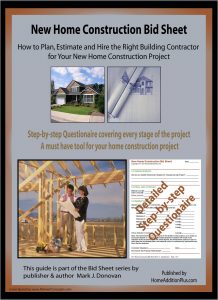What to Watch out for in Home Construction Contracts
By Mark J. Donovan
|
|
Though not a lawyer I have had my share of experiences with home construction contracts. As a homeowner and as an occasional general contractor, I have negotiated and signed numerous home construction contracts with building contractors and subcontractors for building new homes and home additions. Some of the home construction contracts that I signed were quite comprehensive, and others were short and sweet. Both can be acceptable depending upon the size and scope of the project.
Summarized below are a few things to pay attention to when reviewing, negotiating and signing home construction contracts. |
First, always have a complete set of blueprints or drawings, as well as a separate list of unique specifications for the particular new home construction project. By having this type of documentation the home construction contract can be simplified as it can simply reference the drawings and specifications.
Instead it is to show consideration, or earnest interest, in the home construction project. Consequently a home construction contract should not require you to pay more than a 10-15% deposit, and the money should be put into an interest bearing bank account for your benefit.
From personal experience, if you find yourself paying in advance for work to be performed, you may wind up staring at a non-completed home construction project. Ideally you should have the construction contract written in such a way that as much money as possible is held back for the final payment. By doing so, you will help to incentivize the home construction contractor to complete the work to your satisfaction.
Finally, if you feel uncomfortable with the home construction contract language, seek a lawyer to review the contract before signing it. Though it may cost you a few dollars, you will save yourself some worry, and potentially a lot of money.
For more help on building a home addition, see HomeAdditionPlus.com’s Home Addition Bid Sheets. Our Home Addition Bid Sheets provide you with the knowledge and information on how to plan a home building project, and what to look for when hiring contractors. They also include detailed cost breakdown tables and spreadsheets for estimating your own new home construction building costs.
Free Home Addition Price Quotes with No Obligation!
Fill out our 3-5 minute quick and easy form, and receive a free price quote on a house addition from one of our prescreened and licensed home addition contractors. This process is free and there is no obligation to continue once you receive your house addition price estimate.


